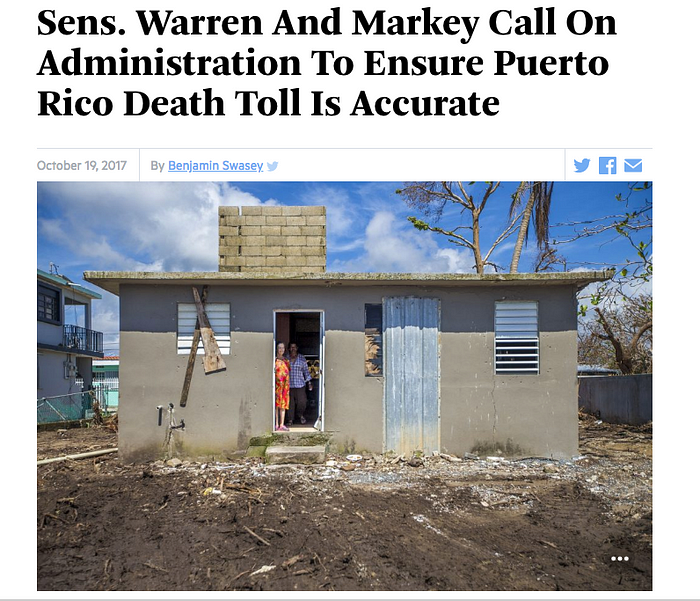Six months after Hurricane Maria
Six months ago today, Hurricane Maria devastated Puerto Rico and the U.S. Virgin Islands.
Recovery is happening — but too slowly. Over 100,000 people are still living without electricity. Thousands still lack drinkable water. And Puerto Rico has received only a fraction of the financial assistance it requested from the federal government. We’re still not sure how many people have permanently fled Puerto Rico due to the storm, as many have sought refuge here on the mainland with families and friends. And we may never know the true number of those who died as a result of Hurricane Maria.
In the months since the storm, I’ve fought hard to ensure the islands have the resources they need to recover, and for better federal oversight of recovery efforts. The needs there are still great, and the response from our federal government has been too little, too late.
Over 300,000 people in Massachusetts have ties to Puerto Rico — and as reports of the damage rolled in, many grew more and more concerned. Nine days after Hurricane Maria hit, I met with community leaders, local elected officials, and concerned citizens in Worcester and Springfield. They told stories of friends and family members on the island who were struggling to survive.
A few days later, I joined some of my Senate colleague at FEMA Headquarters in Washington for a full briefing on the situation in Puerto Rico and the US Virgin Islands. We kept asking, “What is the plan?” We didn’t get a good answer. Even at that early stage, it was clear there was a disconnect between what we were hearing from people on the ground, and what we were hearing from officials. Our federal government told the public there were “no unmet needs” as thousands of Puerto Ricans were struggling to survive without food, without water, without power, without medication, without a way to let loved ones know they were alive.

As Puerto Rico was trying to deal with the effects from the storm, it was also struggling with a mountain of debt. And the Wall Street vultures immediately started circling, hoping to claw back returns from federal disaster relief designated for the island. At a rally on Capitol Hill, I called for debt relief for Puerto Rico, and more assistance for the island.
From the beginning, it was difficult to get good information about the situation on the ground in Puerto Rico — including the number of fatalities. In October, I led a group of Senators and Congressmen in calling for an accurate death count. Six months later, the numbers still aren’t adding up. The official count stands at 64 — but reports show the true number probably exceeds 1,000.

In November, I met with San Juan Mayor Carmen Yulín Cruz. She was supposed to be testifying before the House of Representatives — but Republicans on the committee canceled the hearing at the last minute. So she came by my office to give me an update on the situation in Puerto Rico and the US Virgin Islands. We talked about how the lack of electricity and access to clean water were leading to fatalities.
Later that month, I introduced a comprehensive plan with Senator Bernie Sanders and colleagues to address the humanitarian needs in Puerto Rico and the US Virgin Islands. The legislation is a “Marshall Plan” for the islands that touches on every aspect of the islands’ recovery and provides the sort of bold thinking needed to achieve a successful recovery — without forcing the territories to take on more debt.
At the beginning of 2018, I led members of the Massachusetts Congressional delegation on a trip to Puerto Rico to see firsthand the devastation caused by Hurricane Maria, and what else could be done to help the island’s recovery efforts. We visited a children’s hospital in San Juan. We visited a community health center, and got a briefing from officials on the island. We met with volunteers from the Massachusetts State Police, and visited a shelter in Canóvanas.
While in Puerto Rico, I saw fellow US citizens facing incredible challenges — power lines in the street, water that was making people sick, and children left homeless. People told me how difficult it’s been — and I promised I would fight for them in Congress.

I’m still fighting for Puerto Rico. I’m fighting for federal assistance to restore the island’s electrical grid, and for additional housing for people who lost their homes in the storm. I’m fighting for accessibility to mental health services, and college students who are trying to continue their educations. I’m fighting to ensure that every penny of federal disaster relief goes to those in need, not to Wall Street vulture funds. I’m fighting for Senate hearings about the challenges facing the health and educational systems of Puerto Rico and the U.S. Virgin Islands — and almost 200 organizations have joined my colleagues and me in that call. And I’ll keep fighting for disaster and debt relief for Puerto Rico.
Over the past six months, we’ve made some progress, but we’ve still got a long way to go — and I’ll be right with our brothers and sisters from Puerto Rico and the U.S. Virgin Islands every step of the way.
